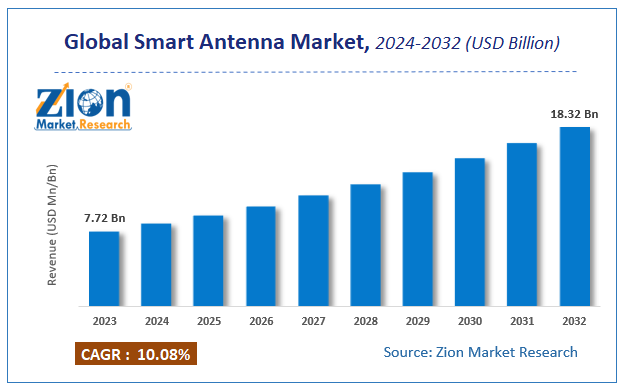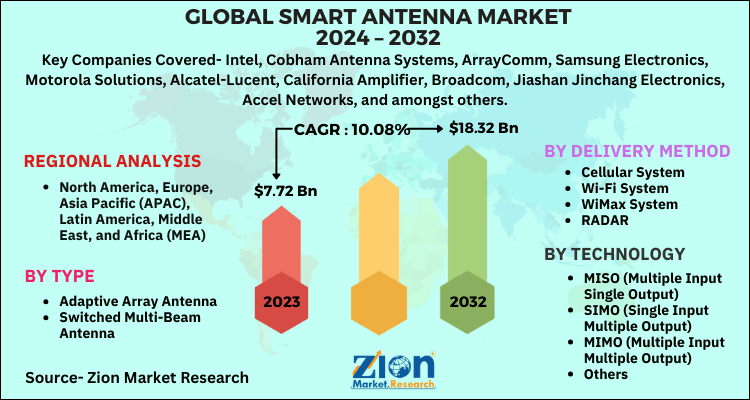Smart Antenna Market Size, Share, Trends, Growth and Forecast 2032

Smart Antenna Market By Type (Adaptive Array and Switched Multi-Beam), By Technology (Multiple Input Single Output, Single Input Multiple Output, Multiple Input Multiple Output, and Others), By Application (Cellular System, Wi-FI System, WiMax System, RADAR, and Others): Global Industry Perspective, Comprehensive Analysis, and Forecast, 2024-2032
| Market Size in 2023 | Market Forecast in 2032 | CAGR (in %) | Base Year |
|---|---|---|---|
| USD 7.72 Billion | USD 18.32 Billion | 10.08% | 2023 |
The global Smart Antenna Market size was worth around USD 7.72 Billion in 2023 and is predicted to grow to around USD 18.32 Billion by 2032 with a compound annual growth rate (CAGR) of roughly 10.08% between 2024 and 2032.
The report analyzes and forecasts the smart antenna market on a global and regional level. The study offers past data from 2018 to 2023 along with a forecast from 2024 to 2032 based on revenue (USD Billion). The assessment of smart antenna market dynamics gives a brief thought into the drivers and restraints of the smart antenna market along with their impact on the demand over the years to come. Additionally, the report also includes the study of opportunities available in the smart antenna market on a global level.
The field of telecommunications that is devoted to the creation, production, and application of sophisticated antenna systems that can dynamically modify their radiation pattern and other attributes in order to maximize signal transmission and reception in wireless communication networks is known as the "smart antenna market." To improve wireless communication systems' efficiency, dependability, and coverage, these antennas use adaptive beamforming techniques and complex signal processing algorithms.
The capacity of smart antennas to adaptively direct and bend antenna beams towards particular users or regions of interest is one of their key features. This helps to minimize interference, increase signal-to-noise ratio, and maximize spectral efficiency. Smart antennas allow for more reliable and robust wireless communication services by constantly modifying their radiation patterns in response to shifting ambient factors, user mobility, and network traffic demands across a variety of operational contexts, including rural, suburban, and urban settings.
The report gives a transparent view of the smart antenna market. We have included a detailed competitive scenario and portfolio of leading vendors operating in the smart antenna market. To understand the competitive landscape in the smart antenna market, an analysis of Porter’s Five Forces model for the smart antenna market has also been included. The study encompasses a market attractiveness analysis, wherein all the segments are benchmarked based on their market size, growth rate, and general attractiveness.
Smart Antenna Market Trends
The market for smart antennas is expanding rapidly due to the increasing need in different industries for better network performance and connection. The market is expanding as a result of 5G technology advancements and the growing uptake of Internet of Things (IoT) devices. In addition, the capabilities of smart antennas are being improved by the integration of machine learning and artificial intelligence algorithms, which makes them more effective and flexible in changing situations.
5G and Beyond A Match Made in Speed
According to market studies, the introduction of 5G networks is driving a spike in the use of smart antennas. Modern antenna technology is needed to manage more data traffic and effectively use the millimeter wave (mmWave) spectrum in order to provide 5G's high speeds and low latency. With its ability to perform beamforming, smart antennas may direct signals toward certain devices, increasing network capacity and enhancing user experience.
Shrinking Antennas, Big Potential for Mobile Devices
The market for smart antennas is becoming more compact because to consumer demand for sleeker, smaller mobile devices. Small, high-performance smart antennas that fit perfectly into tablets, smartphones, and other consumer gadgets appear to be in high demand, according to research. Improvements in material science and antenna design are what are driving this shrinking, which enables producers to fit more functionality into smaller packaging.
Beyond Connectivity Smart Antennas for a Connected Future
The market for smart antennas is expected to grow beyond conventional uses, such as mobile communication. Studies demonstrate how smart antennas are being used more and more in automotive applications such as driverless vehicles and connected cars (V2X). These antennas are essential for features like over-the-air software upgrades for vehicles, collision avoidance systems, and real-time traffic updates because of their capacity to increase signal quality and dependability. This pattern indicates how smart antennas are being included into the larger Internet of Things (IoT) network.
Smart Antenna Market Scope Of the Report
This report offers past, present as well as future analysis and estimates for the Smart Antenna Market. The market estimates that are provided in the report are calculated through an exhaustive research methodology. The research methodology that is adopted involves multiple channels of research, such as – primary research, secondary research, and subject-related expert advice. The market estimates are calculated based on the influence of the current market dynamics along with various economic, social, and political factors on the Smart Antenna Market. Also, various regulations, government spending, and research and development growth define the market data. Both positive, as well as negative changes to the market, are taken into consideration for the market estimates.
Global Smart Antenna Market: Segmentation
The study provides a decisive view of the smart antenna market by segmenting the market based on by application, by type, by technology and by Region.
By Application Segment includes Cellular System, Wi-Fi System, WiMax System, RADAR and Others.
By Type Segment includes Adaptive Array Antenna and Switched Multi-Beam Antenna.
By Technology Segment includes MISO (Multiple Input Single Output), SIMO (Single Input Multiple Output), MIMO (Multiple Input Multiple Output) and Others
The Regional segment includes the present and forecast demand for North America, Europe, Asia Pacific, Latin America, and the Middle East and Africa.
Smart Antenna Market: Report Scope
| Report Attributes | Report Details |
|---|---|
| Report Name | Smart Antenna Market |
| Market Size in 2023 | USD 7.72 Billion |
| Market Forecast in 2032 | USD 18.32 Billion |
| Growth Rate | CAGR of 10.08% |
| Number of Pages | 172 |
| Key Companies Covered | Intel, Cobham Antenna Systems, ArrayComm, Samsung Electronics, Motorola Solutions, Alcatel-Lucent, California Amplifier, Broadcom, Jiashan Jinchang Electronics, Accel Networks, and amongst others |
| Segments Covered | By Type, By Technology, By Application and By Region |
| Regions Covered | North America, Europe, Asia Pacific (APAC), Latin America, Middle East, and Africa (MEA) |
| Base Year | 2023 |
| Historical Year | 2018 to 2022 |
| Forecast Year | 2024 - 2032 |
| Customization Scope | Avail customized purchase options to meet your exact research needs. Request For Customization |
Smart Antenna Market Key Players
Some noticeable players of the smart antenna market are:
- Intel
- Cobham Antenna Systems
- ArrayComm
- Samsung Electronics
- Motorola Solutions
- Alcatel-Lucent
- California Amplifier
- Broadcom
- Jiashan Jinchang Electronics
- Accel Networks
This report segments the global smart antenna market into:
Smart Antenna Market: Type Analysis
- Adaptive Array Antenna
- Switched Multi-Beam Antenna
Smart Antenna Market: Technology Analysis
- MISO (Multiple Input Single Output)
- SIMO (Single Input Multiple Output)
- MIMO (Multiple Input Multiple Output)
- Others
Smart Antenna Market: Application Analysis
- Cellular System
- Wi-Fi System
- WiMax System
- RADAR
- Others
Smart Antenna Market: Regional Analysis
- North America
- The U.S.
- Europe
- UK
- France
- Germany
- Asia Pacific
- China
- Japan
- India
- Latin America
- Brazil
- Middle East and Africa
Table Of Content
Methodology
FrequentlyAsked Questions
The smart antenna market accounted for USD 7.72 Billion in 2023 and is expected to reach USD 18.32 Billion by 2032.
The CAGR value of the smart antenna market is expected to be around 10.08% during 2024-2032.
Some key players of the global smart antenna market are Intel, Cobham Antenna Systems, ArrayComm, Samsung Electronics, Motorola Solutions, Alcatel-Lucent, California Amplifier, Broadcom, Jiashan Jinchang Electronics, and Accel Networks.
Choose License Type
List of Contents
Market Trends 5G and Beyond A Match Made in SpeedShrinking Antennas, Big Potential for Mobile DevicesBeyond Connectivity Smart Antennas for a Connected FutureMarket Scope Of the ReportSegmentationReport ScopeMarket Key PlayersThis report segments the global smart antenna market into:RelatedNews
HappyClients
Zion Market Research
Tel: +1 (302) 444-0166
USA/Canada Toll Free No.+1 (855) 465-4651
3rd Floor,
Mrunal Paradise, Opp Maharaja Hotel,
Pimple Gurav, Pune 411061,
Maharashtra, India
Phone No +91 7768 006 007, +91 7768 006 008
US OFFICE NO +1 (302) 444-0166
US/CAN TOLL FREE +1 (855) 465-4651
Email: sales@zionmarketresearch.com
We have secured system to process your transaction.
Our support available to help you 24 hours a day, five days a week.
Monday - Friday: 9AM - 6PM
Saturday - Sunday: Closed







